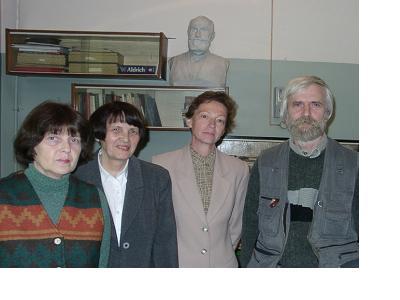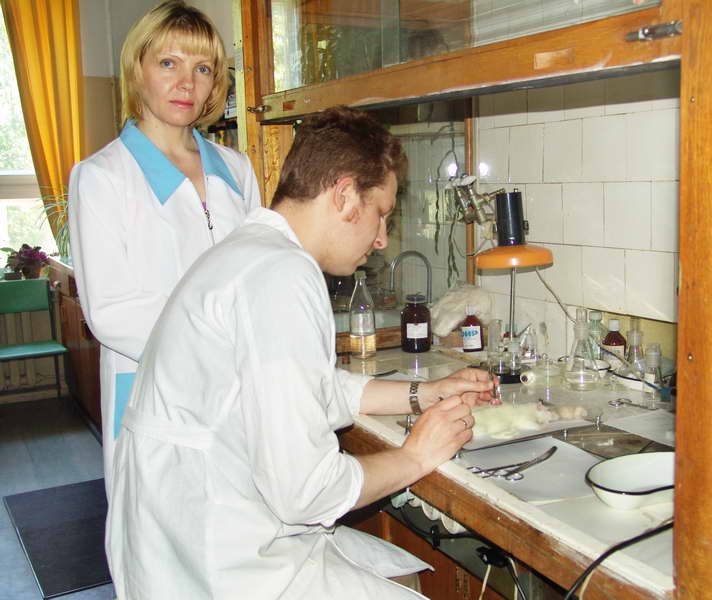The Laboratory was founded in 1960 by Prof. M. I. Mityushov. The main direction of works of the Laboratory long was analysis of physiological and metabolic brain processes depending on the functional state of the pituitary-adrenocortical system.
In 1987, the head of the Laboratory became Medical Sciences Doctor A. A. Filaretov. In the frame of his original direction of studies, regularities of functioning and regulatory mechanisms of the hypothalamus-pituitary-adrenocortical system (HPACS) were studied. Based on investigations of central and peripheral mechanisms of the HPACS regulation a concept was formed of organization of neuroendocrine systems with participation of three efferent hormonal chains.
 Since 1996 the Laboratory is headed Biological Sciences Doctor L. P. Filaretova. The main attention of the staff is paid to a consecutive study of adaptational effects of analgetical and gastroprotective HPACS hormones. Contribution is revealed of hormones of all HPACS chains - glucocorticoids, adrenocorticotropic hormone (ACTH) and cortocotropin-releasing hormone (CTH) - in providing analgesia. It gas been shown that glucocorticoids released in stress are themselves able to produce analgesic effect by involvement in the opioid-independent form of analgesia. An analgesic effect of ACTH is revealed; it is shown to be realized at the expense of two consecutively initiated mechanisms; the opioid-dependent and the opioid- independent one, the latter initiated later and mediated by glucocorticoids. It is revealed that a systemic CTH administration at physiological doses also leads to development of analgesia that is provided by participation both of hormones of the lower HPACS chains and of components unrelated to HPACS. At the same time, the analgesia developing after a central CTH introduction is mediated only by the lower HPACS chains. Since 1996 the Laboratory is headed Biological Sciences Doctor L. P. Filaretova. The main attention of the staff is paid to a consecutive study of adaptational effects of analgetical and gastroprotective HPACS hormones. Contribution is revealed of hormones of all HPACS chains - glucocorticoids, adrenocorticotropic hormone (ACTH) and cortocotropin-releasing hormone (CTH) - in providing analgesia. It gas been shown that glucocorticoids released in stress are themselves able to produce analgesic effect by involvement in the opioid-independent form of analgesia. An analgesic effect of ACTH is revealed; it is shown to be realized at the expense of two consecutively initiated mechanisms; the opioid-dependent and the opioid- independent one, the latter initiated later and mediated by glucocorticoids. It is revealed that a systemic CTH administration at physiological doses also leads to development of analgesia that is provided by participation both of hormones of the lower HPACS chains and of components unrelated to HPACS. At the same time, the analgesia developing after a central CTH introduction is mediated only by the lower HPACS chains.
The obtained results demonstrate new hormonal hormonal mechanisms of regulation of nociceptive sensitivity The main achievement of the Laboratory for the last few years consists in understanding of the role of glucocorticoid hormones in maintenance of integrity of gastric mucosa. This role is as follows: glucocorticoids released during stressor activation of HPACS are glucoprotective, rather than ulcerogenic hormones as this was commonly accepted for several decades; the gastroprotective glucocorticoid effect is active at action of ulcerogenic stimuli of various modalities and intensities; this gastroprotective effect is evident during both formation and healing of acute erosions and chronic ulcers of gastric mucosa; the gastroprotective effect of glucocorticoids is realized through glucocorticoid receptors of the II type and can be associated with: (a) their action on glucose metabolism; (b) their concealing influence on factors of “aggression”; (c) their positive effect on protective factors of gastric mucosa; a cooperative interaction exists between glucocorticoids and prostaglandins in regulation of maintenance of intact gastric mucosa when the decreased gastroprotective action of one factor is compensated by an increased protective influence of the other; glucocorticoid hormones are able to compensate the absence of gastroprotective effect of nitrogen oxide and capsicin-sensitive neurons. sensitivity The main achievement of the Laboratory for the last few years consists in understanding of the role of glucocorticoid hormones in maintenance of integrity of gastric mucosa. This role is as follows: glucocorticoids released during stressor activation of HPACS are glucoprotective, rather than ulcerogenic hormones as this was commonly accepted for several decades; the gastroprotective glucocorticoid effect is active at action of ulcerogenic stimuli of various modalities and intensities; this gastroprotective effect is evident during both formation and healing of acute erosions and chronic ulcers of gastric mucosa; the gastroprotective effect of glucocorticoids is realized through glucocorticoid receptors of the II type and can be associated with: (a) their action on glucose metabolism; (b) their concealing influence on factors of “aggression”; (c) their positive effect on protective factors of gastric mucosa; a cooperative interaction exists between glucocorticoids and prostaglandins in regulation of maintenance of intact gastric mucosa when the decreased gastroprotective action of one factor is compensated by an increased protective influence of the other; glucocorticoid hormones are able to compensate the absence of gastroprotective effect of nitrogen oxide and capsicin-sensitive neurons.
The new consideration of glucocorticoid hormones as of important natural protective factors of gastric mucosa revises essentially the concept of etiology and pathogenesis of the ulcerative disease. |